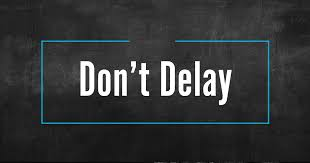Introduction
“Dont Delay” is simple advice with powerful consequences. Whether it’s starting a health routine, applying for a job, fixing a relationship, or launching a small idea, waiting rarely helps. This article explains why procrastination costs you, how small delays become big losses, and practical steps you can use today to stop stalling and start doing.
Why people delay
Humans delay for lots of reasons. Fear of failure, fear of success, perfectionism, and overwhelm are common. Sometimes we wait for the “right moment,” more time, more information, or more confidence. Other times our brain prefers short-term comfort (like scrolling social media) over long-term gain. Understanding the root cause of your delay is the first step toward change.
The real cost of delay
Delaying small actions creates a chain reaction. Little missed opportunities add up. A delayed job application can mean a closed door. Waiting to see a doctor can turn a treatable problem into something serious. Postponing a conversation can make a relationship colder. Time is the one resource that never comes back. When you accept “Dont Delay” as a rule, you protect your future self.
Benefits of acting fast
Acting quickly brings clear benefits: momentum, clarity, and compounding progress. When you start, you learn fast. You eliminate uncertainty by testing ideas instead of guessing. Early action often reveals new opportunities and lets you correct course before you’re deeply invested. Momentum also makes the next steps easier—action breeds action.
Simple habits to stop delaying
- Break tasks into tiny steps. Big projects feel scary. Make one tiny first step—five minutes of research, one paragraph, a short phone call. Tiny wins reduce anxiety and build momentum.
- Set a short deadline. Give yourself 30 minutes or one day. Short deadlines force focus and reduce the tendency to over-plan.
- Use the two-minute rule. If something takes two minutes or less, do it now. Email replies, quick chores, and small decisions shouldn’t be postponed.
- Limit options. Too many choices paralyze action. Pick one approach and start. You can always adjust later.
- Public commitment. Tell a friend or post a pledge. External accountability raises the cost of delay.
- Create “no-excuse” start rituals. A short routine—boiling coffee, opening your laptop, setting a timer—signals your brain to begin.
- Celebrate small wins. Reward yourself for starting. Small celebrations reinforce the habit of immediate action.
How to handle fear and perfectionism
Fear and perfectionism hide behind delay. Treat them like signals—not stop signs. Ask: What’s the worst that can happen? How likely is it? What would I do if it happens? Reframe mistakes as feedback. Perfection is rarely required for meaningful progress; often “good enough” delivered now beats perfect delivered too late.
Examples that show “Dont Delay” works
- Career: Applying early to roles increases your chance of being seen. Many hiring processes are rolling—early applicants have an advantage.
- Health: Early checkups catch problems when they are easier to treat. Prompt lifestyle changes compound into long-term benefits.
- Money: Investing earlier, even small amounts, benefits from compound interest. Waiting to start saving means you must invest more later to catch up.
- Relationships: Addressing small tensions quickly prevents resentments from growing into major conflicts.
When not to rush
“Dont Delay” is powerful, but not a call to reckless haste. Important choices still deserve thought. Use fast action for learning and testing; use careful planning for high-stakes decisions. If a decision has major permanent consequences (large legal or financial commitments), gather necessary information, then act within a reasonable timeframe—don’t let analysis become a way to avoid choosing.
A 7-day kickstart plan
Day 1: Pick one stalled task. Write the smallest possible first step.
Day 2: Do that step within 30 minutes of waking.
Day 3: Tell someone you completed it.
Day 4: Repeat with a second task.
Day 5: Apply the two-minute rule to inboxes and chores.
Day 6: Set a 48-hour deadline for a decision you’ve been avoiding.
Day 7: Reflect on what changed and plan the next week using the same small-step method.
Conclusion
“Dont Delay” is more than a phrase it’s a habit that protects your time, energy, and opportunities. Small actions taken today prevent big problems tomorrow and open doors you didn’t expect. Start with tiny steps, set short deadlines, and treat fear as a sign to move forward, not freeze. The best time to act was yesterday; the next best time is now. Dont Delay begin.
